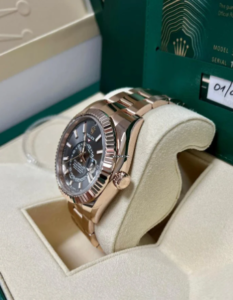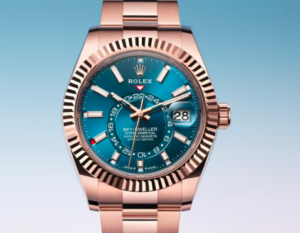Find out the difference: Oyster&Pop’s children’s wall clocks are used to teach people to tell time, while Rolex’s Oyster Perpetual.
Rolex has every right to protect its intellectual property and brand assets.
With sales that could reach 10 billion Swiss francs in 2022, the watchmaker is the most recognized and respected brand in the world; not only in the watch sector, but in all sectors.
No matter how much negative publicity there is about soaring waiting lists, showing watches only at exhibitions, and manipulating the secondary market for its best rolex replica watches, it has not diminished the demand for the crown.
In order to rule the world, you have to stamp out minor intrusions in every corner of your empire, and a small business run by two sisters in Devon has become the latest to invite the wrath of Rolex generals/lawyers.
Oyster&Pop was founded by sisters Emma Ross-McNairn and Sarah Davies during the pandemic.
They pooled their savings to launch a children’s learning clock in 2021, which quickly became a bestseller in the UK and US.
Rolex Oyster Pop Sisters
Oyster&Pop was founded by sisters Emma Rose McNairn and Sarah Davies during the pandemic.
The wall clocks use bright primary colors, descriptions, and numbers in a way that excites children and helps them learn how to tell time, an important skill that Rolex could benefit from.
But Rolex’s lawyers sent a letter to the Oster & Pop sisters warning that “consumers will inevitably be misled into thinking your products are from Rolex” and asking the business to change its logo, website domain name, and name to avoid further action.
As the sisters consider whether to concede to Rolex’s demands, they have set up an online petition listing their case and possible defenses.
“We sell colorful children’s learning clocks and a small range of other learning/office products ranging in price from about $10-$25. Rolex’s Oyster Perpetual Men’s and Women’s fake watches are sold as unique high-end timepieces ranging from approximately $6,500 to $75,000.” They wrote: “We believe there is no risk of anyone confusing us.
“Is it fair,” they asked, “for Rolex to prevent us from using the word oyster?
The dispute could end up in court, but it could also be settled by the U.K. Intellectual Property Office, which is considering Oyster&Pop’s trademark application.
It is this application that Rolex is challenging.
As of today, an online petition in support of Oyster&Pop has been signed by more than 70,000 people and has generated hundreds of comments in support of the sisters.
Oyster&Pop was said to have been chosen as the children’s clock because the sisters were born and raised on the road called Oyster Bend in Paignton, Devon, and they wanted to link the company’s identity to their family roots.